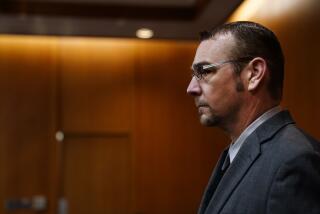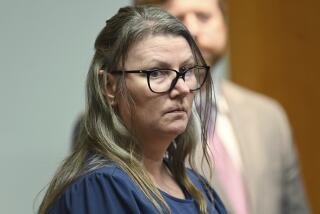Jury selection to begin in trial of James Holmes in Colorado theater massacre
When the gavel drops Tuesday in Courtroom 201 at the Arapahoe County Justice Center, the trial of James E. Holmes, accused of one of the most heinous and vicious mass killings in the nation’s history, is expected to finally begin.
It will have been 914 days since authorities say Holmes burst into a packed suburban movie theater in the Denver suburb of Aurora, tossed a tear gas canister into the crowd and opened fire. The first panicked 911 call came at 12:38 a.m. on July 20, 2012.
The gunshots came less than a second apart, round after round, until 12 people were dead and more than 70 others injured, some permanently, in the barrage of shotgun and semiautomatic gunfire let loose during a screening of the Batman movie “The Dark Knight Rises.”
It has never been in doubt that Holmes, a once brilliant but deeply troubled neuroscience student at the University of Colorado-Denver, pulled the trigger. In July 2013, his lawyers admitted in pretrial court filings that their client was the shooter but contended he had been “in the throes of a psychotic episode.”
Last month, his parents, Robert and Arlene Holmes, broke their silence to issue a statement expressing sympathy with the victims but also saying their son “is not a monster.” They pleaded for his life to be spared: “He is a human being gripped by a severe mental illness.”
The case is being closely watched for its legal implications. Rarely in mass shootings does the gunman survive to face charges. It is a case that from its earliest days has set mental illness and the death penalty on a collision course.
The Holmes trial is expected to last much of 2015; jury selection could take until late spring. And should the death sentence be imposed upon Holmes, now 27, legal experts predict two decades of appeals.
But first a jury must be seated.
A staggering 9,000 summons were mailed to prospective jurors in Arapahoe County. It is a net so wide that in a county with about 500,000 eligible jurors, nearly 1 in 50 residents could receive notices.
“There has never, in the history of Colorado, been a jury trial like this,” said Craig Silverman, a former chief deputy district attorney in Denver turned defense lawyer and expert on jury selection.
Tuesday afternoon, the first 250 people will be ushered into the courtroom in Centennial to begin filling out undisclosed questionnaires. For almost a month, waves of prospective jurors — 500 per day — will repeat the process. The actual questioning of individual jurors is not expected to begin until mid-February, with the final 12 jurors and 12 alternatives not seated until May, according to court administrators.
Because the case has received such enormous publicity and affected so many lives in the area — not only those who know or are connected to the victims, but also first responders, medical personnel, faculty and students at the university — typical exclusions will not apply, legal experts said.
“The question is, how close is too close?” Silverman said.
Jurors must be willing to impose the death penalty to be chosen, and Silverman speculated that a potential juror’s attitude toward mental illness will be a key factor as both sides look to winnow the jury pool to their advantage.
The defense previously offered to let Holmes plead guilty without the possibility of parole if the prosecution would agree not to pursue the death penalty. Dist. Atty. George Brauchler refused, proclaiming that, for Holmes, “justice is death.”
Yet even though Holmes’ actions are not in question, his fate is far from clear-cut.
In Colorado, someone who is insane cannot be put to death, and it is up to the prosecution to convince a jury that the defendant was sane at the moment of the crime. It is one of the few states where the burden is on the prosecution rather than the defense.
Over more than two years, the prosecution has painted Holmes as a man whose life was unraveling, so he launched a methodical plan to kill as many people as possible, amassing body armor, weapons, explosives and ammunition in the months prior to the shootings.
For Holmes’ victims and their families, the trial is both welcomed and dreaded.
“It’s been absolutely brutal for the families. We would have liked to see this over a long, long time ago,” said Sandy Phillips, whose 24-year-old daughter, Jessica Ghawi, an aspiring sports journalist, was killed in the massacre.
Phillips, who lives in San Antonio, will not attend jury selection Tuesday and has not set foot in the courtroom over the last 2 1/2 years. “I am so afraid of my emotions of being in the same room with such evil,” she said.
Still, she has plans to temporarily move to Denver and attend at least part of the trial. She said she needed to confront her feelings of anger, loss and despair.
“Every single morning you think: This is real. Every single evening when I cuddle up with my husband and I am falling asleep, you think of the part of your life that is missing and always will be.”
Dave Hoover, whose 18-year-old nephew, A.J. Boik, was killed, also will skip jury selection but will attend opening and closing arguments. He worries how the trial will affect his sister, Theresa Hoover.
“I flat-out told her not to go,” he said. “It’s too hard. There is no need to go through that trauma. We already had to see A.J. in his coffin — that was traumatic enough. People say the trial will provide closure. There’s not going to be closure. There will never be closure because the loss is always there.”
More to Read
Start your day right
Sign up for Essential California for news, features and recommendations from the L.A. Times and beyond in your inbox six days a week.
You may occasionally receive promotional content from the Los Angeles Times.






